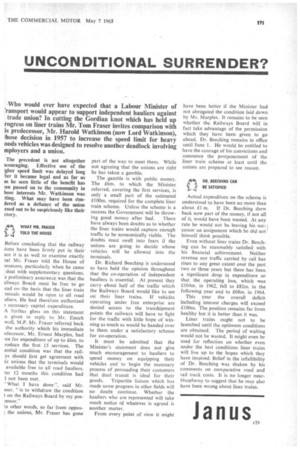UNCONDITIONAL SURRENDER?
Page 173

If you've noticed an error in this article please click here to report it so we can fix it.
Who would ever have expected that a Labour Minister of 'ransport would appear to support independent hauliers against trade union? In cutting the Gordian knot which has held up rogress on liner trains Mr. Tom Fraser invites comparison with is predecessor, Mr. Harold Watkinson (now Lord Watkinson), 'hose decision in 1957 to increase the speed limit for heavy oods vehicles was designed to resolve another deadlock involving mployers and a union.
The precedent is not altogether icouraging. Effective use of the igher speed limit was delayed long !ter it became legal and as far as in be seen little of the benefit has ?,en passed on to the community in hose interests Mr. Watkinson was !ling. What may have been eondered as a defiance of the union rued out to be suspiciously like their ctory.
WHAT MR. FRASER TOLD THE HOUSE
Before concluding that the railway Lions have been firmly put in their ace it is as well to examine exactly lat Mr. Fraser told the House of mrimons, particularly when he came deal with supplementary questions. is preliminary assurance was that the tilways Board must be free to go ead on the basis that the liner train -minals would be open to all road uliers. He had therefore authorized ! necessary capital expenditure.
A further gloss on this statement is given in reply to Mr. Enoch well, M.P. Mr. Fraser referred back the authority which his immediate edecessor, Mr. Ernest Marples, had ,en for expenditure of up to £6m. to roduce the first 15 services. The ;ential condition was that the rail.ys should first get agreement with :ir unions that the terminals would available free to all road hauliers. ter 12 months this condition had
not been met.
What I have done ", said Mr. aser, "is to withdraw the condition t on the Railways Board by my pre:essor."
In other words, so far from oppos; the unions, Mr. Fraser has gone part of the way to meet them. While not agreeing that the unions are right he has taken a gamble.
The gamble is with public money. The £6m. to which the Minister referred, covering the first services, is only a small part of the estimated £I0Orn. required for the complete liner train scheme. Unless the scheme is a success the Government will be throwing good money after bad. There have always been doubts as to whether the liner trains would capture enough traffic to be economically viable. The doubts must swell into fears if the unions are going to decide whose vehicles will be allowed into the terminals.
Dr. Richard Beeching is understood to have held the opinion throughout that the co-operation of independent hauliers is essential. At present they carry about half of the traffic which the Railways Board would like to see on their liner trains. If vehicles operating under free enterprise are denied access to the transhipment points the railways will have to fight for the traffic with little hope of winning as much as would be handed over to them under a satisfactory scheme for co-operation.
It must be admitted that the Minister's statement does not give much encouragement to hauliers to spend money on equipping their vehicles and to begin the necessary process of persuading their customers that dual transit is ideal for their goods. Tripartite liaison which has made some progress in other fields will no doubt continue. Whether the hauliers who are represented will take much notice of whatever is agreed is another matter.
From every point of view it might have been better if the Minister had not abrogated the condition laid down by Mr. Marples. It remains to be seen whether the Railways Board will in fact take advantage of the permission which they have been given to go ahead. Dr. Beeching remains in office until June 1. He would be entitled to have the courage of his convictions and announce the postponement of the liner train scheme at least until the unions arc prepared to see reason.
DR, BEECHING CAN BE SATISFIED
Actual expenditure on the scheme is understood to have been no more than about £1 m. If Dr. Beeching drew back now part of the money, if not all of it, would have been wasted. At any rate he would not be leaving his successor an assignment which he did not himself think possible.
Even without liner trains Dr. Beeching can be reasonably satisfied with his financial achievement. Neither revenue nor traffic carried by rail has risen to any great extent over the past ' two or three years but there has been a significant drop in expenditure so that the operating loss, which was £104m. in 1962, fell to £82m. in the following year and to £68m. in 1964.
This year the overall deficit including interest charges will exceed £100m. The position remains far from healthy but it is better than it was.
Liner trains ought not to be launched until the optimum conditions are obtained. The period of waiting would not be wasted. It might even be used for reflection on whether even under the best conditions liner trains will live up to the hopes which they have inspired. Belief in the infallibility of Dr. Beeching was shaken by his comments on comparative road and rail track costs. It is no longer nearblasphemy to suggest that he may also have been wrong about liner trains.
Janus
























































































































































































































































